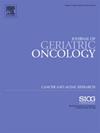体弱多病的老年癌症患者的系统治疗:一个观察队列。
IF 3
3区 医学
Q3 GERIATRICS & GERONTOLOGY
引用次数: 0
摘要
在过去,某些肿瘤治疗不提供给虚弱的老年患者。然而,老年肿瘤学的进步、量身定制的化疗方案、新疗法的引入以及支持治疗的优化都有助于提高治疗边际。我们的目的是通过评估老年体弱转移癌患者的三个月生存率来评估老年人全身治疗的益处。材料和方法:本回顾性队列研究纳入了2020年5月至2022年5月期间在Gustave Roussy医院接受治疗前老年病学评估的70岁及以上转移性癌症患者,根据SIOG-1分类,无论他们接受全身治疗(ST组)还是独家支持治疗(SC组),均被归类为“虚弱”。结果:ST组77例,SC组44例。ST组患者的中位年龄为80.6岁(SC组为82.7岁)。三个月总生存率为81.8%[95%置信区间(CI) 71.8;[88.9] ST组。中位生存期为10.6个月[95% CI 6.3;12.6] ST组。在ST组的多变量分析中,通过日常生活活动(ADL)评估的自主性丧失(HR 2.16 [1.09;4.28])和更多的脆弱因素(HR 1.40 [1.01;[1.95])与较低的三个月生存率相关。讨论:年老体弱的转移性癌症患者可能受益于全身肿瘤治疗。对于在ADL中丧失自主性或有累积性虚弱因素的患者,应谨慎考虑引入这种治疗。本文章由计算机程序翻译,如有差异,请以英文原文为准。
Systemic treatment among frail older patients with cancer: An observational cohort
Introduction
In the past, certain oncological therapies were not offered to frail older patients. However, the advancement of geriatric oncology, tailored chemotherapy regimens, the introduction of new treatments, and the optimization of supportive care have contributed to enhancing the therapeutic margin. We aimed to evaluate the benefit of systemic treatment among older adults by assessing the three-month survival of older frail patients with metastatic cancer.
Materials and Methods
This retrospective cohort study included patients aged 70 and over with metastatic cancer who underwent pre-therapeutic geriatric assessment at Gustave Roussy Hospital between May 2020 and May 2022 and were categorized as “frail” according to the SIOG-1 classification, whether they received systemic treatment (ST group) or exclusive supportive care (SC group).
Results
The ST group included 77 patients, and the SC group included 44 patients. Patients in the ST group had a median age of 80.6 years (82.7 years in SC group). The three-month overall survival rate was 81.8 % [95 % Confidence Interval (CI) 71.8; 88.9] in the ST group. The median survival rate was 10.6 months [95 % CI 6.3; 12.6] in the ST group. In multivariate analysis within the ST group, loss of autonomy assessed by activity of daily living (ADL) (HR 2.16 [1.09; 4.28]) and more frailty factors (HR 1.40 [1.01; 1.95]) were associated with lower three-month survival.
Discussion
Older frail patients with metastatic cancer may benefit from systemic oncologic treatment. The introduction of such treatment for patients with loss of autonomy in ADL or cumulative frailty factors should be considered only with caution.
求助全文
通过发布文献求助,成功后即可免费获取论文全文。
去求助
来源期刊

Journal of geriatric oncology
ONCOLOGY-GERIATRICS & GERONTOLOGY
CiteScore
5.30
自引率
10.00%
发文量
379
审稿时长
80 days
期刊介绍:
The Journal of Geriatric Oncology is an international, multidisciplinary journal which is focused on advancing research in the treatment and survivorship issues of older adults with cancer, as well as literature relevant to education and policy development in geriatric oncology.
The journal welcomes the submission of manuscripts in the following categories:
• Original research articles
• Review articles
• Clinical trials
• Education and training articles
• Short communications
• Perspectives
• Meeting reports
• Letters to the Editor.
 求助内容:
求助内容: 应助结果提醒方式:
应助结果提醒方式:


